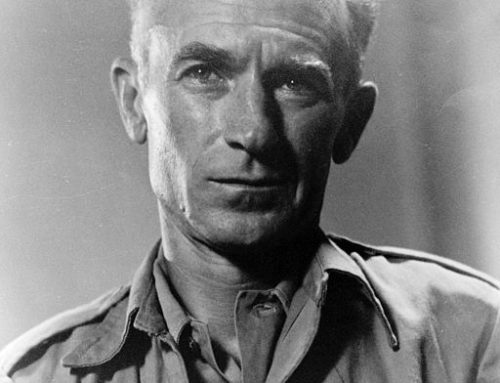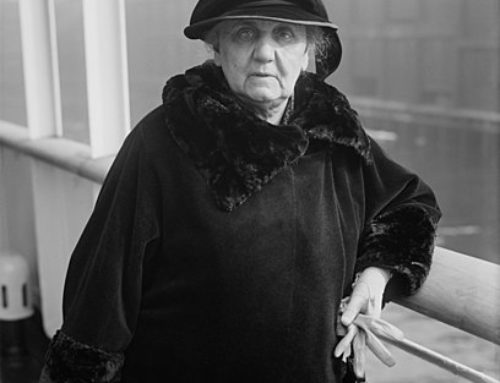I liked Ike when I was eight and he was running for President. I like Ike now, especially after reading Michael Korda’s new biography of Eisenhower. However, for many years in-between I incorrectly perceived Ike as a mundane, big picture executive who lacked vision and statesmanship. Needless to say, as the late Senator Lloyd Bentsen said, “when I am wrong, I am very wrong.” Ike made the right big decisions, but he had mastered the millions of intricate details necessary to command an army of three million men composed of a hodgepodge of nationalities.
In fact, many of Ike’s contemporaries—Churchill, Roosevelt, Marshall, and Charles De Gaulle—felt that Ike was both a great warrior, and diplomat. De Gaulle pointed out that Eisenhower even had “audacity” a trait that has been overlooked for years. Eisenhower not only commanded the two largest amphibious operations in history—Torch and Overlord—but because of his prudence, tact, and fundamental fairness, maintained an alliance of three nations whose interests often diverged sharply.
What caused Ike’s fall from his elevated perch? In part, Mamie and Ike were succeeded by the glamorous John and Jackie Kennedy. Eisenhower, hobbled by two heart attacks, lost his World War II luster. Moreover, his speeches lacked Kennedy’s resonance. On the other hand, in hindsight, the Camelot vision of Kennedy that was carefully orchestrated by Jackie after his assassination has also tarnished over time. Also, Eisenhower recognized that Franklin Roosevelt’s New Deal and Harry Truman’s Fair Deal were bold enough financial experiments. Instead, while the country could not retreat to the laissez faire policies of Coolidge and Harding, we also needed some respite from dramatic governmental intervention in the economy. Lastly, under Eisenhower we were embroiled in a worldwide stalemate with the Soviet Union for dominance of the globe. We saw the emergence of a communist satellite in Cuba, eighty miles from our shore. We also were embarrassed about the Soviet’s seeming technology hegemony in space with their successful launching of Sputnik. In essence, by 1960, we were in a Cold War that had heated flash points in Algeria, Korea, Vietnam, Hungary, and the Middle East. Uncle Joe had been replaced by Nikita Khrushchev, clearly a loose canon whose temper tantrum beating of his shoes on the desk at the United Nations added to his “wild man” mystique.
On the political side, Eisenhower could be forceful when necessary. For example, he used federal forces in Little Rock to insure integration. That is, when his diplomatic efforts with Governor Faubus failed to secure peaceful solution to desegregation, Ike was prepared to use military tools. On another occasion, Eisenhower was willing to oppose our wartime allies France and Great Britain over their role in the Suez crises because he felt strongly that the era of European colonial rule was antiquated. Thirdly, Eisenhower skillfully engineered the downfall of Joe McCarthy, the anti-communist demagogue. Lastly, Eisenhower warned Americans against the growing military industrial complex. That is, he recognized that limiting our military expenditures would allow private enterprise to develop. Even America had to compromise between guns and butter in order to improve the living standard of its citizens.
During World War II, Franklin Roosevelt made the difficult but correct decision in retaining George Marshall as General of the Army and letting Eisenhower command Overlord. That is, Marshall and Eisenhower both did admirable jobs in their respective positions. It is certainly possible that Eisenhower and Marshall could have possibly done each other’s jobs. However we should be mindful of Lincoln famous comment “You do not change horses in midstream.” A dejected Marshall made the ultimate personal sacrifice of remaining in Washington DC. rather than demand the glamorous role of commander of Overlord. Marshall’s sacrifice reflected his strong patriotic streak for he knew that almost nobody remembers the role of General Halleck in the Civil War, but knows the names of Grant, Sherman, Lee, and Jackson. Ironically, Marshall is remembered today primarily for his fabulous role in establishing the Marshall Plan that economically saved beleaguered Europe from falling under the Communist sway, and not his wartime service.
In part, the mediocre military reputation of Eisenhower stems from the war diaries of Montgomery, Alan Brooke, and (posthumously) Patton. In fact, Eisenhower understood the big picture as well as anybody. That is, Eisenhower understood that a “right hook” southeast from Normandy toward the Seine would secure a solid front head in France. Instead of criticizing his fellow generals, Eisenhower took great pains to conceal their weaknesses and emphasize their strengths in his war memoir, Crusade in Europe. In the history of war, nobody has done a better job of coordinating the military efforts of its allies. Eisenhower with incredible tact reined in the competing egos of the Prima Donna generals in order to forge a victorious team. By contrast, Germany could not forge cohesive actions by her generals, leading to major failures both in the Western and Eastern theatre.
Eisenhower could also be innovative, audacious, and courageous. He put his career on the line when he demanded control over the air corps for the Normandy invasion. Eisenhower was prepared to resign rather than allow the air force to be independent of his control. Eisenhower understood like Grant in the civil war that by advancing on a broad front the allies could leverage their advantage in men and material. Ike rejected the notion of a single, clever stroke. Ike combined Grant’s philosophy of victory, and updated it. That is, he executed his broad front vision by using tanks, trucks, and aircraft. Ike personally made modifications to the tank to overcome the hedgerow obstacles found in France, coordinated tank and air planes to pummel the German defenders, secured French ports to insure our troops could get sufficient petrol and ammunition as they moved westward, and understood that destroying the German army, not taking prestigious locations, was paramount.
Eisenhower has been criticized for not taking Berlin, because of its political importance. However, Eisenhower recognized that the Red Army significantly outnumbered the Americans and that we could not afford to antagonize this erstwhile ally. Instead, Eisenhower focused on crushing the German army rather than “taking the Richmond” of Europe. In essence, Eisenhower understood that we should seek to develop some understanding with Stalin rather than lay the seeds for World War III. Stated differently, Americans notoriously forget that most Americans wanted their “boys to return home safe” rather than take on the Red Army.
Between World War I and World War II, Eisenhower shared the vision of George Patton on the importance of the tank and Hap Arnold on the importance of air craft. Between 1918 and 1940, Eisenhower intensively studied military history to learn the lessons of the past, recognized the technological advances that would revolutionize warfare, and developed into the finest staff officer in the army, whose services were sought by General Pershing, General MacArthur, and General Marshall. These three tough bosses demanded and received complete attention to the minutest details.
For us history buffs, we sometimes get enamored with “one liners’ that distort the overall relationship between famous men. For example, MacArthur who depended upon Eisenhower for many years said “Ike was the best clerk he ever had.” Eisenhower in turn said that “He learned acting from MacArthur.” In fact there relationship while strained after Eisenhower surpassed MacArthur in World War II had been most harmonious for the preceding era.
George Patton who wrote disparaging about Eisenhower in his diaries owed his career to Ike. That is, Patton was heartily disliked by George Marshall, Franklin Roosevelt, and Winston Churchill for his abrasive manner, egotism, and lack of political judgment. Eisenhower single handedly saved Patton from oblivion after Patton’s notorious behavior of slapping a soldier who had suffered a mental breakdown. In fact, Omar Bradley was promoted over Patton because Bradley not only possessed wonderful martial skills, but could work well with our British allies.
While the British have an on-going fondness for Bernard Montgomery, his failure to take Caen almost caused the failure of Overlord. Montgomery, the hero of El Alamein, frankly failed to perform well in Sicily, France, and Operation Market-Garden. Despite his failures, Montgomery never lost his high opinion of himself. In a conversation between Churchill and King George VI, Churchill confided that he was concerned that Montgomery wanted his job. The King retorted that he was fearful that Montgomery wanted HIS JOB!
Is there one glaring mistake of Eisenhower that deserves our condemnation? In short, YES! In 1952, Eisenhower while campaigning in Wisconsin failed to verbally support his longtime friend and supporter George Marshall against Joe McCarthy’s snide comments that “Marshall was a dupe of the communists, who failed to secure a settlement between Chiang Kai Shek and Mao Zedong. In fact, Chiang “Cash my Check” in the words of Vinegar Joe Stilwell, the foremost American military advisor to China, said that Chiang could not fight his way out of a Shanghai Whore House. Other critics maintain that Chiang was too strong to overturn and to weak to rule. In a nutshell, Mao by 1948 had the upper hand and knew that within months he could drive the Nationalists out of Mainland China. As Barbara Tuchman said, we did not lose China! We never had 1 billion Chinese to lose. All we had was a few missionaries who had nostalgic unrealistic dreams about their vision of China. For the rest of Eisenhower’s and Marshall’s life, both men worked very hard to overcome Eisenhower’s failure to stand up to McCarthy. Eisenhower repeatedly visited the ailing Marshall at Walter Reed hospital, honored him and White House receptions, and ultimately cut the rug from underneath McCarthy’s feet. Thus, in fairness to Eisenhower’s critics, Eisenhower on that occasion allowed political expediency to override decency and loyalty. Nevertheless, we must judge a man by the fabric of a lifetime of actions. Under this rubric, Eisenhower stands as a Giant among Twentieth Century Men!



